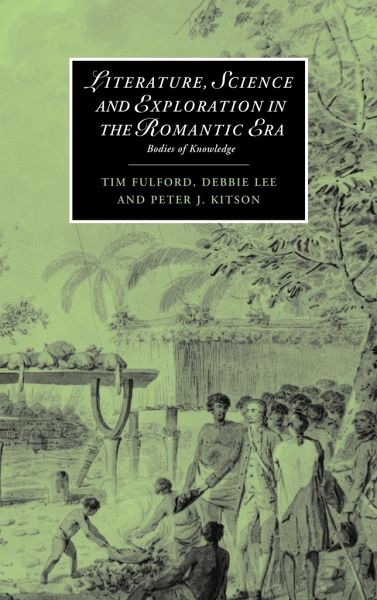
Literature, Science and Exploration in the Romantic Era
Bodies of Knowledge
Versandkostenfrei!
Versandfertig in 1-2 Wochen
109,99 €
inkl. MwSt.

PAYBACK Punkte
55 °P sammeln!
Examines the massive impact of colonial exploration on British scientific and literary activity between the 1760s and 1830s.In 1768, Captain James Cook made the most important scientific voyage of the eighteenth century. He was not alone: scores of explorers like Cook, travelling in the name of science, brought new worlds and new peoples within the horizon of European knowledge for the first time. Their discoveries changed the course of science. Old scientific disciplines, such as astronomy and botany, were transformed; new ones, like craniology and comparative anatomy, were brought into being...
Examines the massive impact of colonial exploration on British scientific and literary activity between the 1760s and 1830s.
In 1768, Captain James Cook made the most important scientific voyage of the eighteenth century. He was not alone: scores of explorers like Cook, travelling in the name of science, brought new worlds and new peoples within the horizon of European knowledge for the first time. Their discoveries changed the course of science. Old scientific disciplines, such as astronomy and botany, were transformed; new ones, like craniology and comparative anatomy, were brought into being. Scientific disciplines, in turn, pushed literature of the period towards new subjects, forms and styles. Works as diverse as Mary Shelley's Frankenstein and Wordsworth's Excursion responded to the explorers' and scientists' latest discoveries. This wide-ranging and well-illustrated study shows how literary Romanticism arose partly in response to science's appropriation of explorers' encounters with foreign people and places and how it, in turn, changed the profile of science and exploration.
Table of content:
List of illustrations; Acknowledgements; A note on the text; Frequently cited texts; Introduction: bodies of knowledge; Part I. Exploration, Science and Literature: 1. Sir Joseph Banks and his networks; 2. Tahiti in London; London in Tahiti: tools of power; 3. Indian flowers and Romantic Orientalism; 4. Mental travellers: Banks, African exploration and the Romantic imagination; 5. Banks, Bligh and the breadfruit: slave plantations, tropical islands and the rhetoric of Romanticism; 6. Exploration, headhunting and race theory: the skull beneath the skin; 7. Theories of terrestrial magnetism and the search for the poles; Part II. British Science and Literature in the Context of Empire: 8. 'Man electrified man': Romantic revolution and the legacy of Benjamin Franklin; 9. The beast within: vaccination, Romanticism and the Jenneration of disease; 10. Britain's little black boys and the technologies of benevolence; Conclusion; Notes; Index.
In 1768, Captain James Cook made the most important scientific voyage of the eighteenth century. He was not alone: scores of explorers like Cook, travelling in the name of science, brought new worlds and new peoples within the horizon of European knowledge for the first time. Their discoveries changed the course of science. Old scientific disciplines, such as astronomy and botany, were transformed; new ones, like craniology and comparative anatomy, were brought into being. Scientific disciplines, in turn, pushed literature of the period towards new subjects, forms and styles. Works as diverse as Mary Shelley's Frankenstein and Wordsworth's Excursion responded to the explorers' and scientists' latest discoveries. This wide-ranging and well-illustrated study shows how literary Romanticism arose partly in response to science's appropriation of explorers' encounters with foreign people and places and how it, in turn, changed the profile of science and exploration.
Table of content:
List of illustrations; Acknowledgements; A note on the text; Frequently cited texts; Introduction: bodies of knowledge; Part I. Exploration, Science and Literature: 1. Sir Joseph Banks and his networks; 2. Tahiti in London; London in Tahiti: tools of power; 3. Indian flowers and Romantic Orientalism; 4. Mental travellers: Banks, African exploration and the Romantic imagination; 5. Banks, Bligh and the breadfruit: slave plantations, tropical islands and the rhetoric of Romanticism; 6. Exploration, headhunting and race theory: the skull beneath the skin; 7. Theories of terrestrial magnetism and the search for the poles; Part II. British Science and Literature in the Context of Empire: 8. 'Man electrified man': Romantic revolution and the legacy of Benjamin Franklin; 9. The beast within: vaccination, Romanticism and the Jenneration of disease; 10. Britain's little black boys and the technologies of benevolence; Conclusion; Notes; Index.




